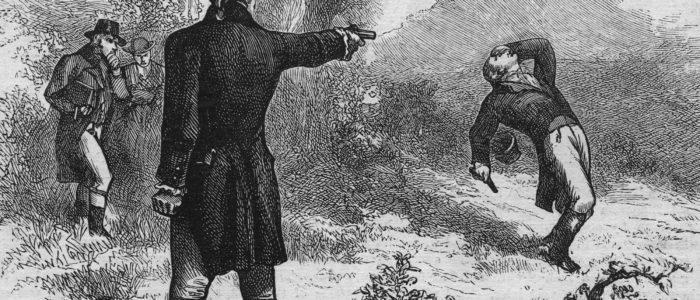Choosing the right mediator for resolving your dispute is important and can make all the difference in the world. In the case of Alexander Hamilton, he chose the wrong mediator and it cost him his life.
The Aaron Burr v. Alexander Hamilton duel has received recent attention due to the popular Broadway play and the epic biography by Ron Chernow. The dispute between these two men is one of the most infamous political conflicts in American history and ended in a bad way.
Burr and Hamilton had some particularly strong bitterness toward each other that developed in politics. The conflict began in 1791 when Burr won a United States Senate seat from Philip Schuyler, Hamilton’s father-in-law. During the 1804 New York gubernatorial race, Hamilton had some mean-spirited things to say about Burr who was running for the office. Burr had hurt feelings and demanded a duel, a form of alternative dispute resolution available to the parties.
This form of ADR was used after a perceived offense and one party would demand satisfaction from the offender. Usually, the demand was delivered in writing. Both parties would then obtain the assistance of one or more close friends who acted as “seconds” – or a mediator as we are now known.
The seconds had a number of responsibilities and the most important was to do everything in their power to avert bloodshed and death. This could involve back and forth correspondence or meetings about a mutually agreeable resolution, such as a formal apology for the alleged offense or some settlement that would be agreeable between the parties.
In the event that the seconds failed to persuade their principals to avoid a fight, then the next course of negotiation involved agreeing to the exact rules or etiquette for dueling referred to as the code duello. Again, a really good “second†could find a way to mediate some rules that would minimize the chances that the parties would die. For example, the parties might agree to use swords and fight only until blood was drawn, thus significantly limiting the likelihood of death or grave injury since a scratch could be considered as satisfying honor.
According to Wikipedia, Hamilton himself had been a very successful “second†in numerous duels, including disputes with William Gordon (1779), Aedanus Burke (1790), John Francis Mercer (1792–1793), James Nicholson (1795), James Monroe (1797), and Ebenezer Purdy and George Clinton (1804). He also served as a second to John Laurens in a 1779 duel with General Charles Lee, and to client John Auldjo in a 1787 duel with William Pierce. He knew how to negotiate peace.
Unfortunately, Hamilton chose Judge Nathaniel Pendleton to serve as his second and Judge Pendleton did a lousy job. The mediation between the parties failed miserably. The rules for the duel were disastrous and the duel was fought with pistols on the morning of July 11, 1804. Burr shot Hamilton, while Hamilton fired into a tree branch above Burr’s head. Hamilton died the following day. The death of Hamilton led to the demise of the Federalist Party in American politics. Burr was vilified for shooting Hamilton and never held another high office after his tenure of Vice President ended in 1805. Judge Pendleton went back to private practice and apparently never served as a second ever again. All this from a bad mediation.
Choosing the right mediator is important for maximizing the chances for peaceful resolution of your dispute. A mediator that understands the procedural and substantive issues will help the parties find a mutually agreeable resolution. Don’t be like Hamilton; pick a mediator that will help the parties negotiate suitable terms for a settlement and everyone will live for another day.

